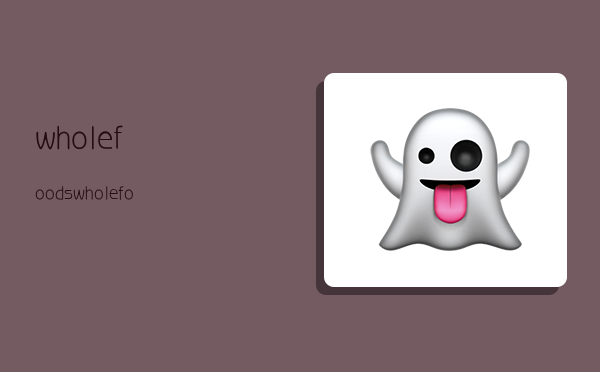wholefoods,wholefood是什么意思
关于wholefoods可能家人们还不了解,今天爱六八收集了wholefoods相关资料为大家介绍:

What is Wholefoods and What Does it Mean?
Wholefoods is a term that refers to food products that have undergone minimal processing and contain no artificial additives or preservatives. These types of foods are often considered to be healthier and more nutritious than their processed counterparts.
The Definition of Wholefoods
The term "wholefoods" can be defined as foods that have not been heavily processed and are free from artificial additives and preservatives. Examples of wholefoods include fruits, vegetables, whole grains, legumes, and nuts. These types of foods are typically rich in vitamins, minerals, and other nutrients that are essential for good health.
The Benefits of Wholefoods
There are many benefits to incorporating wholefoods into your diet. Since these types of foods are minimally processed, they tend to be more nutrient-dense, meaning that they contain more vitamins, minerals, and other beneficial compounds than processed foods.
Wholefoods are also a great source of dietary fiber, which is important for maintaining digestive health and promoting feelings of fullness. Additionally, many wholefoods contain antioxidants, which can help protect your body against oxidative stress and lower your risk of chronic diseases.
Lastly, some studies have shown that diets rich in wholefoods may be associated with a lower risk of certain types of cancers, cardiovascular disease, and other chronic conditions.
Examples of Wholefoods
There are many different types of foods that fall under the category of wholefoods. Some examples include:
- Fruits: apples, bananas, oranges, berries, grapes, etc.
- Vegetables: broccoli, cauliflower, carrots, spinach, kale, etc.
- Whole grains: brown rice, quinoa, oats, barley, etc.
- Legumes: lentils, beans, chickpeas, black-eyed peas, etc.
- Nuts: almonds, walnuts, cashews, peanuts, etc.
The Difference Between Wholefoods and Processed Foods
Processed foods are those that have been altered in some way from their natural state, often through the addition of artificial ingredients or preservatives. These types of foods often contain high amounts of added sugars, sodium, and unhealthy fats, which can contribute to a number of health problems when consumed in excess.
Wholefoods, on the other hand, are as close to their natural state as possible and contain no artificial ingredients or preservatives. They tend to be lower in calories and higher in nutrients than processed foods, making them a healthier choice overall.
How to Incorporate Wholefoods into Your Diet
If you"re looking to add more wholefoods to your diet, there are many ways to do so. Some easy tips include:
- Start each day with a nutritious breakfast that includes whole grains, fruits, and healthy fats.
- Replace processed snacks with wholefoods like fresh fruits, raw veggies, or nuts.
- Make half of your plate at each meal consist of fruits and vegetables.
- Choose whole grain breads, pastas, and cereals instead of their refined counterparts.
- Experiment with new wholefoods by trying out new recipes or incorporating them into your favorite dishes.
By making these small changes, you can start enjoying the many benefits of wholefoods and improve your overall health and wellbeing.
Conclusion
In summary, wholefoods are minimally processed foods that are free from artificial additives and preservatives. They are rich in nutrients, dietary fiber, and antioxidants, and may offer a number of health benefits. By incorporating more wholefoods into your diet, you can promote better health and wellbeing over the long term.
以上是爱六八为您介绍关于wholefoods的全部内容,更多精彩敬请持续关注爱六八外贸知识大全网。
wholefoods,wholefood是什么意思
wholefoods,wholefood是什么意思发表于2023-06-25,由admins编辑,文章《wholefoods,wholefood是什么意思》由admins于2023年06月25日发布于本网,共3637个字,共8人围观,目录为外贸百科,如果您还要了解相关内容敬请点击下方标签,便可快捷查找与文章《wholefoods,wholefood是什么意思》相关的内容。
版权声明:
文章:(wholefoods,wholefood是什么意思),来源:,阅读原文。
wholefoods,wholefood是什么意思若有[原创]标注,均为本站原创文章,任何内容仅供学习参考,未经允许不得转载,任何内容不得引用,文章若为转载文章,请注明作者来源,本站仅为分享知识,不参与商业活动,若有侵权请联系管理删除


 微信扫一扫打赏
微信扫一扫打赏
 支付宝扫一扫打赏
支付宝扫一扫打赏




















